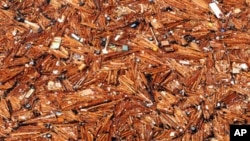University of Hawaii researchers are projecting that the first batch of debris, including construction material, cars, trees, roof tops and household items, could hit Hawaii in about two years
U.S. researches say a huge amount of debris from remnants of Japan's coastal towns swept away in last month's tsunami is moving across the Pacific Ocean and could reach the United States in the next few years.
University of Hawaii researchers are projecting that the first batch of debris, including construction material, cars, trees, roof tops and household items, could hit Hawaii in about two years and reach California's shore in three years.
|
Listen to Ira Mellman's interview with Jan Hafner from the International Pacific Research Center |
Jan Hafner, scientific computer programmer at the university's International Pacific Research Center, told VOA Tuesday that an island of debris has already moved a few hundred kilometers away from the Japanese shore and strong currents are moving it across the ocean..
Hafner said by the time the debris reaches the U.S. West Coast, it will turn into what the scientist calls "the North Pacific garbage patch." Batches of that garbage are expected to continue trickling to Hawaii shores for about five more years.
The projections are based on a diagnostic model, which has been developed using realistic data about objects drifting over the ocean surface.
The projections are not good news for the Hawaiian coastal communities battling a constant tide of trash that washes ashore on their beaches. The Hawaii Wildlife Fund held a beach cleanup earlier this month on the Big Island's shoreline, which attracts floating trash.
But while the regular ocean trash represents an environmental hazard, large pieces of debris represent a maritime hazard for ships sailing across the ocean.
The U.S. Navy's 7th Fleet says the largest debris field is more than 100 kilometers long.




